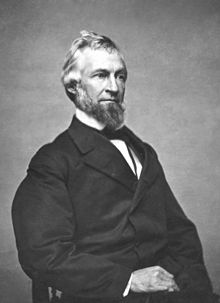James A. McDougall
| James A. McDougall | |
|---|---|

Senator James Alexander McDougall
|
|
|
United States Senator from California |
|
|
In office March 4, 1861 – March 4, 1867 |
|
| Preceded by | William M. Gwin |
| Succeeded by | Cornelius Cole |
| Member of the U.S. House of Representatives from California's at-large district |
|
|
In office March 4, 1853 – March 3, 1855 |
|
| Preceded by | Joseph W. McCorkle |
| Succeeded by | Philemon T. Herbert |
| Attorney General of Illinois | |
|
In office 1843–1846 |
|
| Preceded by | Josiah Lamborn |
| Succeeded by | David B. Campbell |
| Attorney General of California | |
|
In office 1850–1851 |
|
| Preceded by | Edward J. C. Kewen |
| Succeeded by | Serranus Clinton Hastings |
| Personal details | |
| Born |
November 19, 1817 Bethlehem, New York |
| Died | September 3, 1867 (aged 49) Albany, New York |
| Resting place |
Holy Cross Cemetery, Colma, California |
| Political party | Union Democrat |
| Occupation | Attorney, Politician |
James Alexander McDougall (November 19, 1817 – September 3, 1867) was an American attorney and politician elected to statewide office in two U.S. states, then to the United States House of Representatives and United States Senate. A gifted orator, McDougall began his career as a civil engineer in New York, then read law, rising quickly to heights in his profession in Illinois, where he became a friend of fellow prairie attorneys Abraham Lincoln, Edward D. Baker, and Stephen Douglas. Like many Americans, McDougall was drawn to Gold Rush California in 1849; he resumed his law practice and was elected second attorney general for the new state of California. In the election of 1860, Lincoln won the presidency as a Republican, Baker was elected Republican senator from Oregon, and McDougall was elected senator from California, joining Douglas in the Senate as fellow War Democrats. All three of McDougall's Prairie State friends would die in the six years before his term as senator expired. A noted drinker, McDougall once gave an address to the Senate disparaging a proposed rule to outlaw the sale of alcohol in the United States Capitol, but died shortly after leaving the Senate, "...hastened by his indulgence in the bowl."
...
Wikipedia
